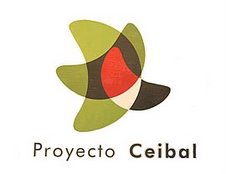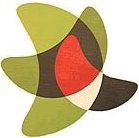Anecdotes of Plan Ceibal in Durazno, Uruguay
(Translated from Spanish. Original article by Rosamel Ramírez: "Anécdotas del Plan Ceibal en Durazno")
Anecdote #1
The most stunning thing I saw was in the first Expo-Fair of Plan Ceibal at the Independence Square in the city of Durazno.
Touring the stands and talking to other teachers and children of different schools, I arrived at the stand of School #81 of intellectually disabled.
There they were the students with their XO very well cared for. The teacher Laura on the alert, with a lot of dedication, narrated the following.
"This student could never communicate before she had the computer, she didn't vocalize a single phrase... however, using the program Record, taking photographs and shooting videos, almost always with her as a protagonist, I was able to make her family take photos and shoot videos at home, and that she tells me something about that at school.
The same thing we do at school and she talks about that at home.
I'm delighted, I can't believe it, now she pays attention, she participates a little, and even sometimes she tries to make questions.
It is an everyday excercise, with low expectations about her achievements due to her condition, but it is like a miracle what happened to her."
Anecdote #2
In my 6th grade class I had a 14-year-old student that didn't know how to read.
He was very anxious to recibing his laptop.
He had serious behavior and social problems that he was controlling inside the classrom.
When the computers arrived we distributed them and I proposed to write a text in Write.
He had liked very much a play at the school.
He had been moved by and identified with Nacho, one of the characters.
Then he told me:
- Teacher, I want to write about Nacho... but I don't know.
- Come and tell me what you want to write.
He told me orally.
He brought his laptop, entered to Write and wrote everything he proposed himself.
He knew almost all the phonemes and graphemes, but he didn't know how to join them.
- What a beautiful work you did! Now you have to read it to your classmates.
- But I don't know how to read?
- Ah, it doesn't matter, you will know because you did it - I said in a low voice with complicity and a wink.
He read it many times in silence, he passed it to his notebook, he stood in the front and with tears in his eyes, he read the text to the class.
- I know how to read, I know how to read! - he would shout, excited and smiling
For him it was an unforgettable day, he wrote and the read aloud... then he read simple texts written in his classmate's XOs... this is how he started his literacy.
Anecdote #3
After many days using TurtleArt, I proposed my students of 6th grade to draw a parallelogram with its median parallels and to designate every point in it with an upper-case letter.
But...
- How? - they asked - if we can't write here.
- Ah... maybe you can... to the one who makes it I will give a pendrive.
I was almost sure that they wouldn't make it.
That day we had visits from abroad, about Plan Ceibal in the school, and just when the were entering our class, Matías Cantero said:
- I won the pendrive!
Everyone ran to his desk... and the class was a commotion.
I explained briefly to the Inspectors and the Director what was going on, because I was inhibited by so many visits at the same time.
I had planned another thing... but that had to wait for later.
They weren't uncomfortable.
They talked spontaneously with swede and american visitors, thru a translator.
Effectively, Matías won me over.
He drew every letter as a geometric figure of very small dimensions, making computations of p.t and angles, because he couldn't erase anything or else his whole work would be erased.
Very exciting.
We gave him an applause.
At least here I think he was the first to make letters with TurtleArt.
I gave him a pendrive, but I didn't make more bets like this, there wouldn't be a budget to honor them.
By themselves they organized a competition of vocals in TurtleArt in the following days, then consonants, they would put conditions for the measures, the use of Arc...
They would display their work on my desk and they would call as "judges" children from other classes, at random.
There were still prizes but of a lower category, hair clips for girls, keyrings for boys, and so on.
But by themselves they became dettached from material rewards.
On another day they proved the amount of diagonals on a regular polygon with more than 4 sides... and again Matías, that was not outstanding until then, found the generalization with a little help from me by telling him that the amount of vertices is called "n".
He explained it to his classmates.
They arrived at the formula (n-3).n/2.
It took us many weeks.
Anecdote #4
Within the scope of the family it is impressive what the kids make their parents do with the laptop.
They teach them to connect to Internet, to enter and exit correctly from the programs.
Néstor told me that his father, who is a constructor, would search for house models and make plans in TurtleArt to build them later.
Besides that, with the calculator they would make the budget for the materials, among other things.
And the list in Write.
Anecdote #5
In another home... of the Ortega family, the mother studies to teach Introduction to Law, she uses the computer, downloads the subjects from Internet, about Pedagogy, about Freire, she told me, and many more.
Then she would come to our school and we taught her to use the pendrive she had bought with her savings.
She has three children at school.
Teacher Nancy, from 3rd grade B, where one of her daughters studies, teaches very well to use the XO.
Carlos is in my class and he's very enthusiastic about TurtleArt, ESPECIALLY.
He would write his final works in write and print them in a cybercafe, to present them.
He had never touched a computer before.
Anecdote #6
His husband is an artist in leather engraving.
He wants to photogarph his works with Record and make a blog to publicize them.
We arranged to do it in March.
He's very enthusiastic about making his work worldwide.
A wonderful community impact in Uruguay of Plan Ceibal and the whole community.
Who can still remain doubtful about its success?


